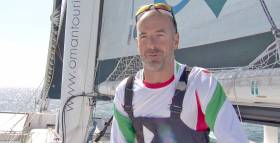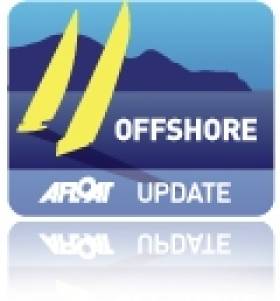Displaying items by tag: Musandam
Three high speed MOD70s are closing in on the Volvo Round Ireland Race finish line at Wicklow, for what might yet be a record breaking time, early tomorrow morning. In an exclusive pre–start video (below) for Afloat.ie, Digby Fox interviewed County Kerry sailor Damian Foxall onboard Round Ireland record holder Musandam Oman, currently off Rathlin Island.
In this video, Foxall, a Volvo Ocean Race winner, who has sailed eight round the world races, reveals he has never sailed Round Ireland! And Foxall's crew–mates, including skipper Sidney Gavignet, give an insight into sailing the fastest boats in the world and the importance of their 2015 record.
See Round Ireland tracker here and keep to up to date with the fleet's progress with Afloat's regular Round Ireland 2016 updates here
#roundirelandspeeedsailing record – It's been a tricky second night at sea for Musandam-Oman Sail's in its Round Ireland speed sailing record bid. At 0600 the six-man international team is speeding past Dungarvan on the south coast at over 24 knots. It's an impressive speed but there is still approximately 120–nautical miles to sail to the Dublin Bay finish line. Force six winds are blowing from a favourable westerly direction and forecast to get stronger this morning and there is a flood tide until lunchtime, but several hours spent in little wind off the Mayo coast yesterday afternoon may yet prove costly.
This time yesterday, the crew were surfing across the top of Donegal. Only 12 hours ago, the team was halfway down the west coast of Ireland in a low pressure and 'on track for a mid–morning finish' this morning. Reports from onboard last night said 'It is likely to be a challenging night'. Since then they have sailed 170–nautical miles to the Fastnet Rock, hitting speeds of 27 knots off the Kerry coast. They came close inshore at Cape Clear at midnight before heading offshore again in an attempt to make faster progress along the Munster coast. Since midnight the crew have been focussing on the final 200 nautical miles to the finish.
To beat the 22–year record set by Steve Fosset's Lakota in 1993, the Oman Sail Mod 70 Multihull needs to cross the line before 1400 hours this afternoon. At 0800, with the final 100nm to go, the team, who had originally signalled an ETA at 'mid–morning' have revised this to be 'middle of the day'. It is an indication perhaps, if the Fosset record is broken, it will not be by much even if speeds do increase up the Wexford and Wicklow coasts this morning.






























































